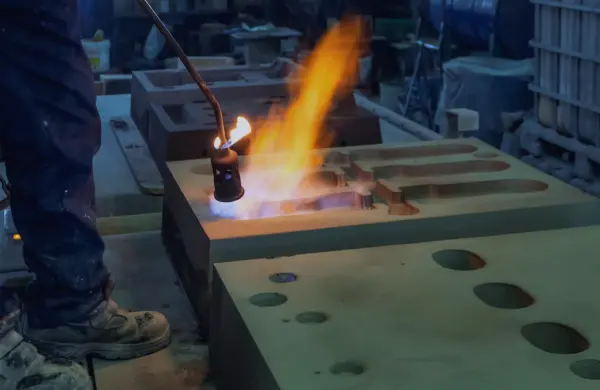Excitement About Alcast Company
Excitement About Alcast Company
Blog Article
Alcast Company Fundamentals Explained
Table of ContentsThe Buzz on Alcast CompanyAll About Alcast CompanyOur Alcast Company PDFsFascination About Alcast CompanyThe Definitive Guide to Alcast CompanyEverything about Alcast Company
The refined difference hinges on the chemical content. Chemical Comparison of Cast Aluminum Alloys Silicon promotes castability by lowering the alloy's melting temperature and improving fluidity throughout spreading. It plays a critical role in enabling detailed mold and mildews to be loaded accurately. Furthermore, silicon adds to the alloy's toughness and wear resistance, making it valuable in applications where toughness is important, such as auto parts and engine components.It likewise enhances the machinability of the alloy, making it easier to process into ended up products. By doing this, iron adds to the overall workability of aluminum alloys. Copper raises electrical conductivity, making it advantageous in electric applications. It also improves rust resistance and contributes to the alloy's overall stamina.
Manganese adds to the toughness of aluminum alloys and improves workability (Casting Foundry). It is commonly made use of in functioned light weight aluminum items like sheets, extrusions, and profiles. The visibility of manganese help in the alloy's formability and resistance to splitting during fabrication processes. Magnesium is a light-weight element that supplies strength and impact resistance to aluminum alloys.
Some Ideas on Alcast Company You Should Know
Zinc boosts the castability of aluminum alloys and aids regulate the solidification process throughout spreading. It boosts the alloy's strength and solidity.

The main thermal conductivity, tensile toughness, return strength, and prolongation vary. Select ideal basic materials according to the performance of the target product produced. Amongst the above alloys, A356 has the highest possible thermal conductivity, and A380 and ADC12 have the most affordable. The tensile limitation is the contrary. A360 has the very best return toughness and the highest possible prolongation price.
The Greatest Guide To Alcast Company

In precision spreading, 6063 is well-suited for applications where complex geometries and top notch surface area finishes are vital. Examples include telecommunication rooms, where the alloy's superior formability permits streamlined and aesthetically pleasing styles while preserving structural stability. In the Lights Solutions sector, precision-cast 6063 parts develop elegant and efficient illumination fixtures that need complex forms and excellent thermal efficiency.
The A360 exhibits premium elongation, making it optimal for complicated and thin-walled parts. In accuracy casting applications, A360 is well-suited for sectors such as Consumer Electronics, Telecommunication, and Power Tools.
The Main Principles Of Alcast Company
Its unique residential or commercial properties make A360 a beneficial choice for precision spreading in these industries, improving item toughness and quality. Aluminum alloy 380, or A380, is a commonly used spreading alloy with numerous distinct characteristics. It uses excellent castability, making it a suitable choice for precision spreading. A380 shows excellent fluidness when molten, guaranteeing complex and thorough molds are properly recreated.
In precision casting, aluminum 413 shines in the Customer Electronic Devices and Power Devices sectors. It's frequently utilized to craft elaborate components like smartphone housings, camera bodies, and power device cases. Its precision is amazing, with tight resistances as much as 0.01 mm, making sure perfect product setting up. This alloy's remarkable rust resistance makes it an outstanding choice for exterior applications, making sure resilient, durable items in the stated markets.
Some Ideas on Alcast Company You Should Know
Once you have determined that the aluminum pass away casting procedure appropriates for your job, an important following action is picking the most suitable alloy. The aluminum alloy you select will considerably affect both the spreading process and the properties of the final product. Since of this, you have to make your choice carefully and take an informed strategy.
Figuring out the most appropriate aluminum alloy for your application will imply weighing a large variety of qualities. The first classification addresses alloy attributes that impact the production process.
Some Known Details About Alcast Company
The alloy you select for die casting directly impacts several elements of the spreading process, like just how simple the alloy is to collaborate with and if it is susceptible to casting defects. Warm cracking, likewise referred to as solidification cracking, is a normal die spreading problem for aluminum alloys that can lead to internal or surface-level rips or fractures.
Certain light weight aluminum alloys are much more prone to hot breaking than others, and your option needs to consider this. Another typical issue found in the die casting of aluminum is pass away soldering, which is when the actors stays with the die wall surfaces and makes ejection difficult. It can damage both the cast and the die, so you must seek alloys with high anti-soldering buildings.
Rust resistance, which is currently a remarkable feature of light weight aluminum, can differ substantially from alloy to alloy and is an important characteristic to think about relying on the ecological conditions your item will certainly be revealed to (Aluminum Castings). Use resistance is one more building generally looked for in aluminum products and can differentiate some alloys
Report this page